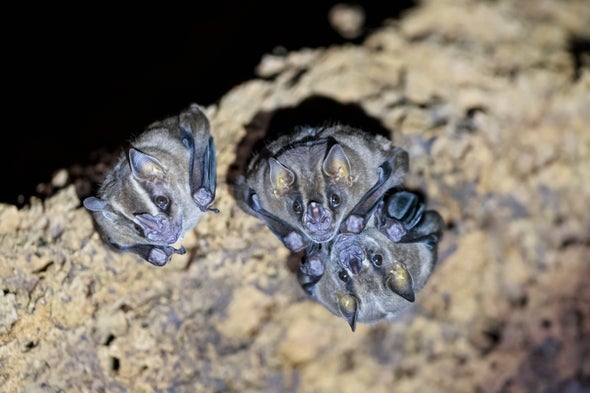(单词翻译:单击)
听力文本
This is Scientific American's 60-second Science. I'm Jason Goldman.
Epidemiologists have long known that socially connected individuals like friends, family and co-workers are more likely to transmit pathogens to each other. But when an individual becomes obviously ill, their social connections become temporarily reduced: When we feel sick, we tend to stay away from others. And when we appear sick, others tend to stay away from us. That distancing usually helps to slow down the spread of a pathogen.
But not all social relationships work the same way. Parents of sick children will continue to care for those children at the risk of their own health. And that devotion is true beyond humans. Consider vampire bats. They usually groom their own offspring as well as other bats. And they share food. But illness changes some of those activities.
To track illness and behavior in a vampire bat community, researchers injected some bats with a substance that triggered their immune systems—the bats felt less well than usual without actually suffering from a disease.
In this situation, unrelated bats stopped grooming each other. But mothers continued to care for their offspring, even if one of them seemed to be infected.

"In these changes in grooming, there was a difference between unrelated bats and maternal relationships. So what it looked like was that sick moms kept grooming their offspring, and healthy moms maintained grooming their sick offspring. Whereas we saw reductions between unrelated bats."
Sebastian Stockmaier, a graduate student in integrative biology at the University of Texas at Austin, who led the study. Food sharing was different.
"So it looked like sick bats still received food from others, but they were groomed less by others. And so there are these infection-induced changes to social behaviors caused by these sickness behaviors, but they might vary, depending on what behavior you actually observe."
So not only does the type of relationship matter, but the type of behavior does as well. It's as if the bats set up this sick-time rule: I'll feed you by regurgitating a blood meal into your mouth—but that's it.
The study was in the Journal of Animal Ecology.
The social relationships among vampire bats work a lot like human friendships. And when trying to understand the spread of infectious diseases through social networks, says Stockmaier, vampire bats teach us that the type of relationship and the type of interaction are important variables to consider.
Thanks for listening for Scientific American's 60-second Science. I'm Jason Goldman.
参考译文
这里是科学美国人——60秒科学。我是杰森·古德曼。
流行病学家早就知道,像朋友、家人和同事等社交联系人更容易相互传播致病菌。但当他们明显生病时,其社交关系就会暂时减少:我们感觉自己生病时,会倾向于远离他人。当我们生病时,其他人往往会远离我们。这种距离通常有助于减缓病菌的传播。
但并非所有社交关系都遵循这一规律。患病幼体的父母会不顾自身健康继续照顾孩子。这种奉献精神确实超越了人类。以吸血蝙蝠为例。和它们通常会为自己的后代和同类梳理毛发。它们也会分享食物。但疾病改变了其中某些活动。
为了追踪吸血蝙蝠群体的疾病和行为,研究人员给某些蝙蝠注射了触发免疫系统的物质,使它们感觉比平时不舒服,但并未真的患病。
在这种情况下,无亲缘关系的蝙蝠不再互相梳毛。但蝙蝠母亲会继续照顾自己的孩子,即使其中一只已被传染上疾病。
“无亲缘关系的蝙蝠和亲子关系蝙蝠在梳毛方面存在区别。患病母亲继续为后代梳毛,健康母亲仍旧为患病后代梳毛。而无亲缘关系蝙蝠的梳毛行为则在减少。”
领导这项研究的得克萨斯大学奥斯汀分校的综合生物学研究生塞巴斯蒂安·斯托克梅尔说到。食物分享则不同。
“同类仍会分食物给生病蝙蝠,但较少为其梳毛。因此,这些疾病行为引起的社交行为感染诱发改变,但改变可能会因实际观察到的行为而有所不同。”
因此,不仅关系的种类重要,行为类型也很重要。就好像蝙蝠设置了生病期间规则:我会将把反刍血液喂给你,但仅此而已。
这项研究发表在《动物生态学期刊》上。
吸血蝙蝠的社交关系很像人类的友谊。斯托克梅尔表示,在试图了解传染病在社交网络的扩散时,吸血蝙蝠教会我们,关系种类和互动类型是需要考虑的重要变量。aaa
谢谢大家收听科学美国人——60秒科学。我是杰森·古德曼。
译文为可可英语翻译,未经授权请勿转载!
重点讲解
重点讲解:
1. stay away from 远离;
Children must be warned to stay away from main roads.
必须警告孩子们远离交通要道。
2. at the risk of 冒着…危险;担着…的风险;
He was determined to find out the truth even at the risk of his life.
他决心查出真相,虽冒生命危险在所不惜。
3. care for 照料;照顾;护理;
His natural mother was unable to care for him so he was raised by an aunt.
他的生母不能照顾他,所以他是姑姑抚养大的。
4. depend on 取决于;根据;由…决定;
Whether we need more food depends on how many people turn up.
我们是否需要更多的食物,这要视到场人数而定。


